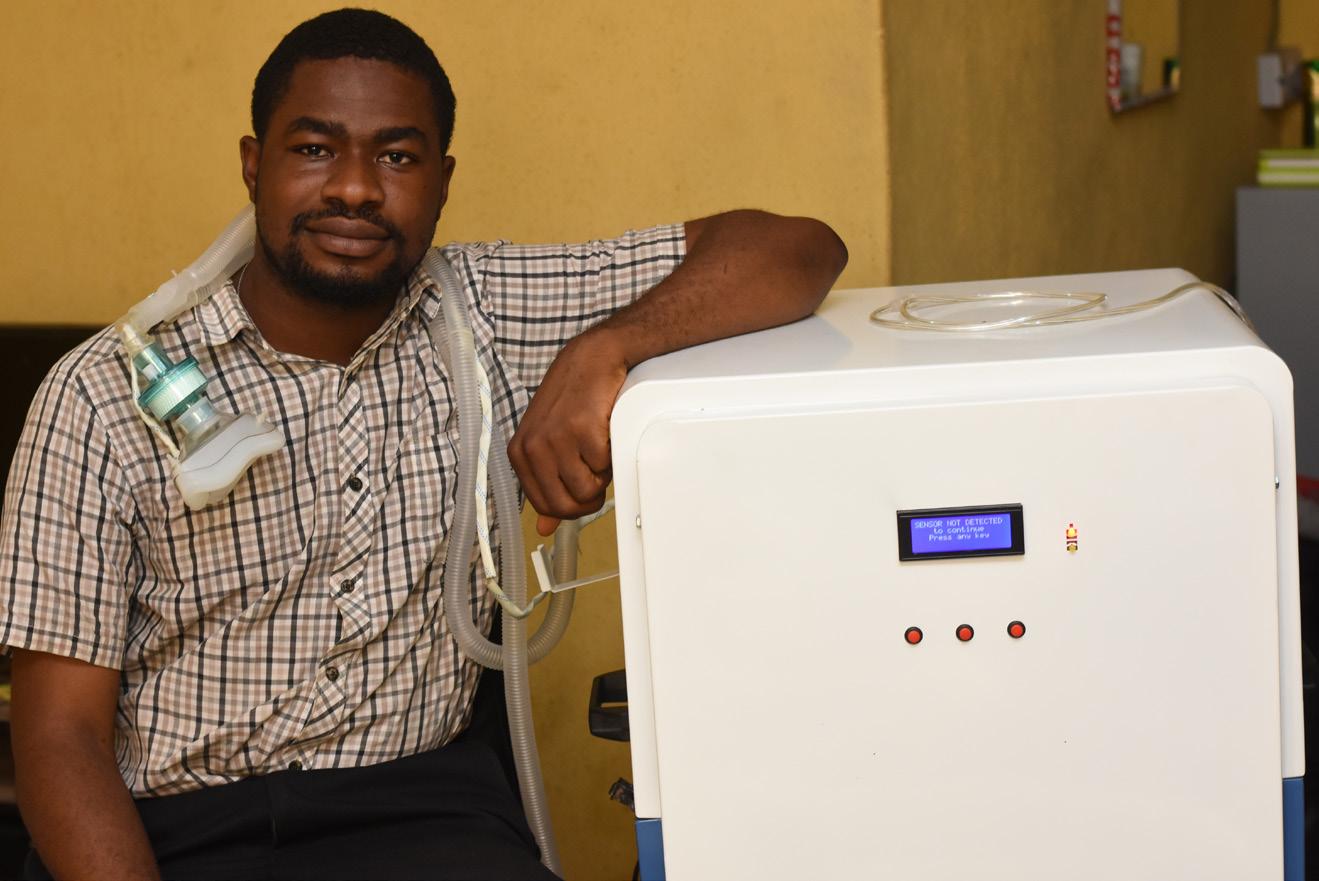
9 minute read
CAREER IN ENERGY MANAGEMENT - FIGHTING CLIMATE CHANGE IN NIGERIA

What attracted you into sustainability in the first place?
Advertisement
I’m Kelvin Enumah, a Programmes and Sustainability Manager at the Wetland Cultural and Education Foundation, where I am involved in technical and vocational training, youth development, talent engagement, optimised operations, and partnerships in Nigeria. To describe me in short: my career is practically focused on mutually dependent goals of developing people to promote sustainability. I strongly think growing up and living in Nigeria is enough of a driver to go into the sustainability sector. I decided to study electromechanics at the Institute for Industrial Technology in Lagos. While studying, I started volunteering at the institute by designing and implementing campaigns and advocacy projects. We visited schools, churches, exam centers, etc. We reached and generated over 1000 contacts in all. We made presentations in schools about the need for skills and the need for parents to stop the stigma against technical education in Nigeria. This stigma that is yet to be overcome is mainly a result of the unattractiveness of technical and vocational education in Nigeria. The budget for technical and vocational education is only about 0.2% of the national budget for education (and the budget for education is less than the recommended 15% of the federal budget by UNESCO). Industries are yet to embrace Technical and Vocational Education and Training (TVET) and the dual training system; hence very few industries fund TVET compared to the expected outcome. The national TVET pathway policy exists but is not being implemented, and TVET graduates are highly marginalised and at a disadvantage during application for jobs and further studies. The system is disincentivised and not dynamic enough to cope with its socioeconomic realities. These put together have disenfranchised many youths and families from towing this path.
During one of my visits, I went to a pig farm in one of the local communities in the southwest of Nigeria, all dressed and hoping to impress the youth working there and convince them to acquire technical skills. After speaking on the benefits of TVET and all, one of the fellows asked me loudly if he would be paid to learn skills. I was awed as a fellow youth, which left a deep impression on me.
How did you progress through your career?
As part of my three years dual training electromechanics programme at the Institute for Industrial Technology, I was equipped with a multiskilling technical background and mindset. I interned in the engineering department at Guinness Nigeria Plc., where I carried out electrical and automation duties in the silo, process, and utility areas. I also played the role of secretary for the department – in summary, I learned how to work with people and with machines. I also interned in the maintenance department at Leoplast Nigeria Ltd., a plastics manufacturing company. In both companies, I saw recycling and reusing first hand – this practically prepared me for the future. In 2013, I started working in a social TVET project as an industrial automation and optimisation trainer at the Institute for Industrial Technology. I trained young school leavers, university graduates, and industry workers in the use of hydraulics and pneumatics technology, electro-pneumatics and sensor technology, programmable logic controllers, and process control. Using my knowledge of industrial automation, I completed a building automation control project in 2014, which was the start of building management systems for me. I became interested and completed some Schneider’s Energy University
courses and advanced training in KNX systems. I ended up designing a building management system curriculum and content. At this point, I had already completed my City and Guilds of London Institute Level 3 in Electrical and Electronics Engineering and Level 5 in Engineering Qualification.
I soon saw the need for professional membership and registration following my professional activities. I decided to join the Energy Institute and got registered as an incorporated engineer with the Engineering Council UK and completed the City and Guilds of London Institute learning, teaching, and competence assessor certification.
I started volunteering more often with energy and tech startups and with technical vocational education and training, education, and women empowerment non-profits; as of today, I have volunteered with at least 5 organisations. In 2019, I started and launched the Energy Institute Young Professionals Network Nigeria and handed over to my successor at the end of 2021. I’ve recently taken up a programmes and sustainability role in another organisation, and I must say that the build-up has been incredible, a lot learned, and much more to be learned and done.
What does your current role entail?
I am presently a Sustainability and Development Manager with Wetland Cultural and Education Foundation. Wetland CEF promotes sustainability in Nigeria and focuses on providing programmes, communication, and financial sustainability support to non-profit organisations and social enterprises. Wetland CEF also develops clean energy and climate improvement projects (like; designing energy management training curriculums, providing training in building management systems and technologies, and organising energy awareness programmes for students). I provide operational, programmes and financial sustainability advice to about 20 organisations in varying sectors across the Nigerian economy.
What are the challenges for energy management and sustainability in Nigeria?
The main challenges lie in the limited energy access in Nigeria; according to Sustainable Energy for All (SEforAll) and the World Bank, as of 2015, the electricity access rate in Nigeria was nearly 60%, with 86% of urban areas and 41% of rural areas with access. It might also be necessary to know that the population of Nigeria as of 2016 was 186 million. Fast forward to 2019, the population was around 200 million and electricity access was at 55.4%. Nigeria ranks 171 out of 190 countries in getting electricity – with over 43% of its population not having access.
“Over 85 million Nigerians still don’t have access to grid electricity” – World Bank.
Some years ago, the Power Holding Company of Nigeria (PHCN) was eventually unbundled by the government and divested into eleven electricity distribution companies (DisCos), six generating companies (GenCos), and a transmission company (TCN) . As at 2014, with 23 installed fossil fuel power stations, 1 coal-powered plant, and 4 hydroelectric power stations Nigeria had an installed power generation capacity of about 10,000 MW but only a maximum of 4,500 MW was being generated. Today, Nigeria has a capacity of over 13,000 MW and according to the Nigerian Bulk Electricity Trading PLC., 1,936MW of hydro, 1,080MW of solar and 11,560MW Gas/Thermal of generated electricity is sold to the transmission company of Nigeria. Still electricity access is at 60%. Many homes, businesses and companies are beginning to see the need for renewable/alternative sources of energy. There is still an unreliable electrical grid in Nigeria. There is always a need to decentralise, distribute and democratise access to energy. The drive for effective metering is increasing and installations are quite rapid. Many renewable energy start-ups are springing up and this is driving the purchasing cost lower when compared with previous years and options are more now at least. Several years ago, in my role at the Institute for Industrial Technology, Nigeria was gearing towards implementing the privatisation policy of the power sector and a problematic skills gap was emerging. It was inevitable that partnerships were needed to tackle this identified skills gap. Examples of this is the Seeds of Hope Project with the Institut Européen de Coopération et de Développement (IECD) , Cummins, CFAO and Scheneider Electrics, to develop the Electrotechnics programme and train out-of-school youths that would fill the skills gap in the power sector and be uplifted from poverty. The overall impact was significant: over 500 youths have enquired about this programme, best 90 youths selected and trained and 90 familes have benefited from this programme and have been uplifted from the cycle of poverty. Between 40 – 50 youths are currently in training at present. Though the electrotechnics programme had the power sector as its primary impact area, I have handled over 10 recruitment requests from other engineering sectors for graduates of this programme. It promises a lot to know that there are graduates from an energy focus programme fitting into other sectors in roles like; maintenance technician, packaging technician,
service technician, facility manager and so on. This programme remains an impactful one in the Nigerian society as I have been working ceaselessly on sustainability models for this programme. While speaking with Henrie Adesina one of the programme graduates recently about his career and interest in energy, he said; “I am grateful I started my energy career as an electrotechnics trainee at IIT and went on to intern with Cummins”.
What is your biggest achievement to date?
In a few words – it has been empowering youths and developing communities.
I would say my most significant achievement to date is starting Rivents Lab. In 2017, I saw the need to set up a team of enthusiastic, hands-on technical students and graduates of the Institute for Industrial Technology to think, design, and recreate, focusing on climate-friendly and clean energy solutions. The team started by making motobots with used plastics and discarded furniture parts for secondary school students. In 2020, the team’s ability was tested through a grant competition to prototype a locally made ventilator. The team emerged co-winner for the NgVentilator competition after prototyping a low-cost, climatefriendly, battery-powered, and phonecontrolled automatic ventilator. We hoped the ventilator would be mass produced to support many patients dying of Covid 19 due to inadequate ventilators; unfortunately, it didn’t. I hope someday to see Rivents Lab in full operation with its own lab space and more inventions.
What are the climate change drivers in Nigeria?
Education is very essential for the energy transition and sustainability in Nigeria. More short, mid, and longterm programmes will create the necessary awareness, knowledge, and skills for children and young professionals. Reducing the entry barriers for these programmes, decentralise and being consistent. Education, education, education is the key.
More small grants with considerable access requirements for rural and urban development are certainly a meaningful way to journey towards the net-zero goal in Nigeria, having ratified the Paris agreement on climate change in 2017 and aligning with the UN SDG, it has pledged to reduce its greenhouse gas emissions by 20% by 2030. The UN SDG index shows that Nigeria is on track to achieving this. Properly designed funding programmes to upskill, educate, provide access to power, reduce wood burning (which, according to studies by ICEED is still the cause of 78,000 premature deaths and about 55 million metric tons of carbon dioxide emission), manage waste and recycle plastics (only about 12% are currently been recycled and most of the unrecycled contributing to the blockage of drains and canals), electronics, batteries, and even photovoltaic panels (about 140 tons of solar waste) will be impactful. There is a popular secular saying in western Nigeria “Owo ni koko!” Which literarily means, “Money is the key”.
Where do you see your future within the sustainability sector?
For my part, I clearly will continue working with people at an increasing rate to deliver sustainable development in Nigeria. I am currently seeking funding to continue my masters’ programme, which I have already started in sustainable development and diplomacy. Within the next three years, I aim to design more capacity development and community-related programmes to impact up to 3000 youths. I hope to grow a development fund for the technical and vocational schools that will promote sustainability by training youths from resource-deprived backgrounds to $100m in order to scale their impact by 50%. Ultimately, we need a people-centered approach in Nigeria, building a just society that will succeed in the once-in-ageneration challenge of tackling climate change. I hope to take on more roles in the sustainability sector to broaden my exposure further and grow my experience.







